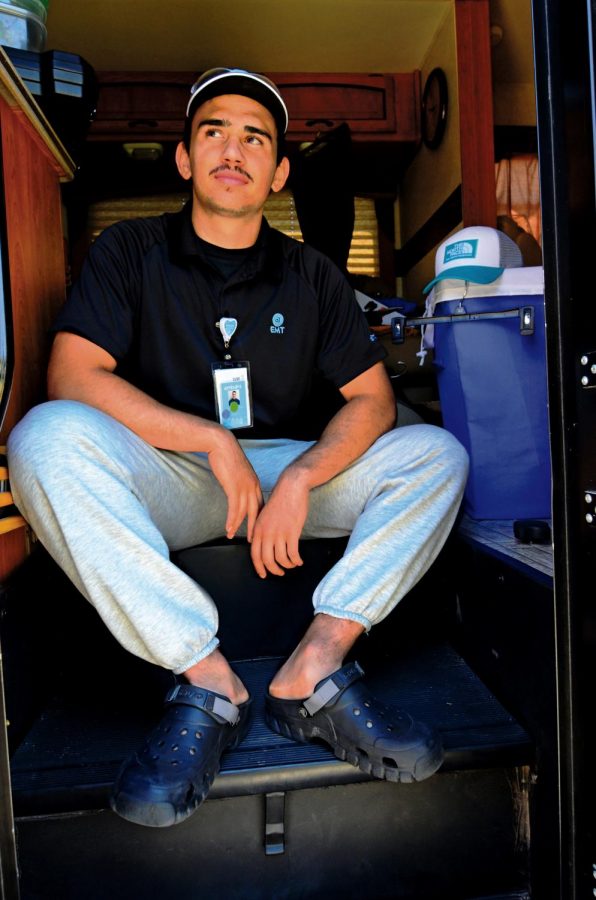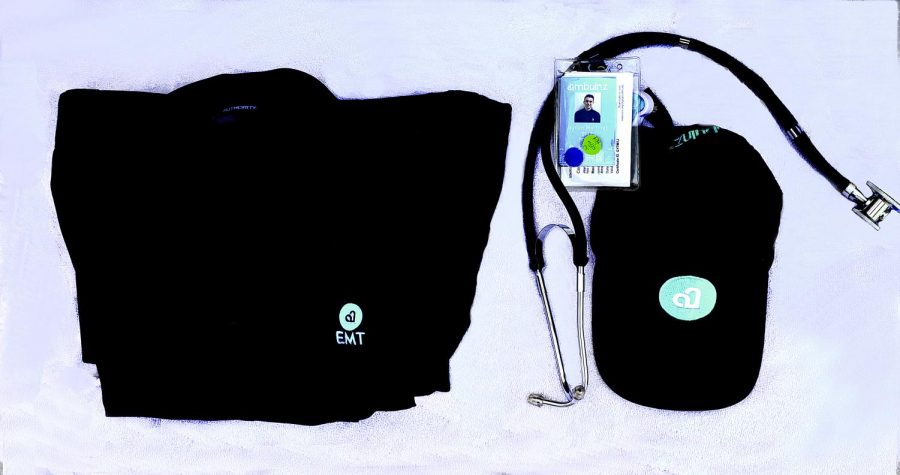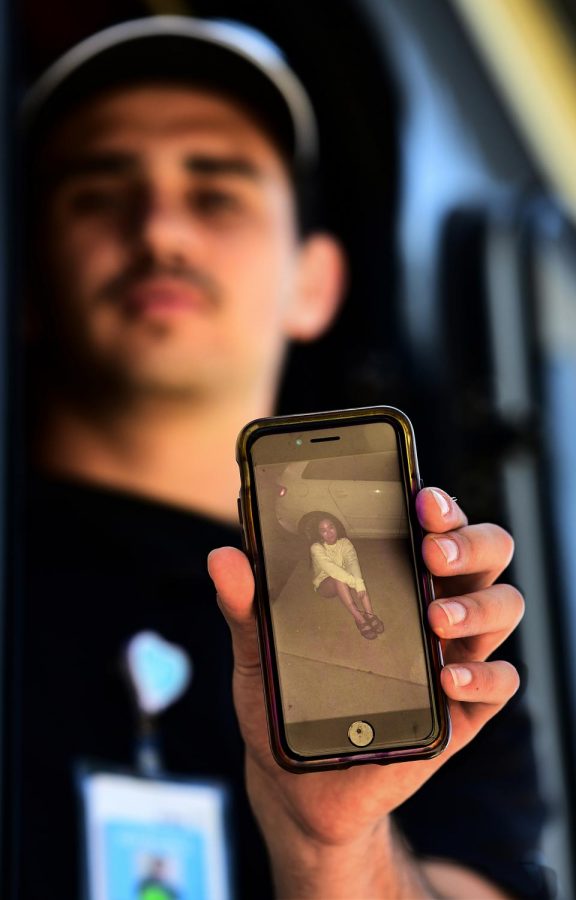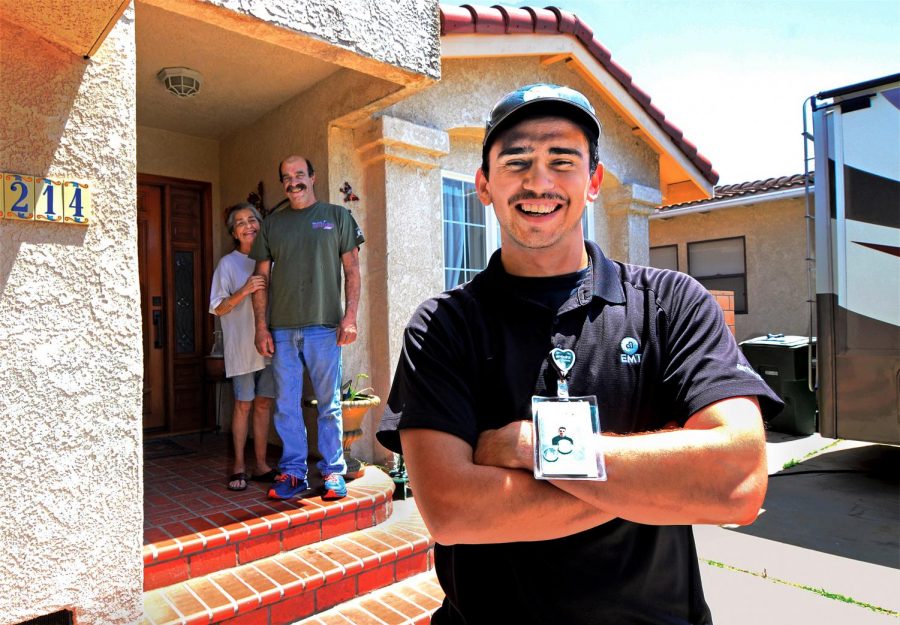EMT Jayden Martinez, 20, keeps a safe distance from his grandparents Loudres and Nelson Martinez. Jayden has moved into his family’s RV during the COVID-19 pandemic to keep his family safe from infection. Photo credit: Gary Kohatsu
He Lives Remotely to Work The Front Lines
June 8, 2020
He wakes up for a morning jog at 7 a.m. followed by his exercises.
Push-ups. Sit-ups. Dips.
Before working out, he enjoys listening to David Goggin’s videos, an ex-Navy SEAL and motivational speaker who he says is the toughest person around.
This is Jayden Martinez.
Tall with broad shoulders, his athleticism came from competing in wrestling when he was in high school, and over time he maintained the same workouts.
“I sometimes feel lazy to get up and run in the morning but when I hear Goggin’s crazy 100 miles run with broken feet story, I do it,” Jayden says.
He returns from his jog to a 30-foot-long modern RV around 10 a.m., where he goes into the refrigerator and makes himself breakfast. Eggs and toast. He gets ready for work wishing the water in the RV would warm up faster so he could take hotter showers in the morning.
Off to work.
Jayden is an emergency medical technician for a private company called Ambulnz. Ambulnz is an ambulance and EMT company that has various stations around southern California; Jayden’s specific location is located in Torrance where each shift involves a different vehicle and partner.
His brown RV stocked with food, supplies, and clothing isn’t his permanent residence, but for now, it’s where he lives.
During this pandemic, Jayden must live there because of his grandparents, great-grandma, and brother.
As an EMT, he deals with COVID-19 patients often, so he stays in the RV to protect his family. Before the pandemic, his family would use the RV for family vacations, but now his grandfather took it out of storage so Jayden could use it as a temporary home.
The Torrance Fire Department Assistant Chief of Emergency Medical Services Alec Miller says there have been circumstances in which personnel has had to live separated from family due to COVID-19. In addition to this, other safety measures have been put in place to prevent the spread within the fire department.
The Torrance Fire Department implemented “station isolation staffing,” meaning that nobody is allowed to work at any other station that they aren’t assigned to. This was put into place to avoid COVID-19 from spreading to other stations Miller says.
Similarly to Jayden’s situation, one of the Torrance Fire Department captains was exposed to COVID-19 and later tested positive for the virus. He had to quarantine for 26 days in his garage. He would eat dinner out in the yard with his family at a safe distance to be with them, Miller says.

Jayden, 20, lives and grew up in Torrance his entire life and recently, in December 2019, acquired his EMT certification from El Camino College.
He graduated from North High School in Torrance in 2018 and then followed his passion for wrestling at Cerritos Community College as a kinesiology major. Once his wrestling days were over he decided to attend ECC and enroll in the EMT program.
“In high school, I was indecisive in what I wanted to major in, but I was always strong in science classes, I knew I didn’t want to waste time and got my EMT certification and I’m planning to go into the fire academy at El Camino,” Jayden says.
After acquiring his certification, he works full time and also takes classes at ECC to fulfill the requirements the fire academy needs.
His first assignment: to work the frontlines and help people during a worldwide pandemic.
“I make $14.25 an hour and every call we get assigned to is an extra $5,” Jayden says. “It’s crazy to think that I just finished up my schooling for this and now I’m working during this whole coronavirus problem, I’m kinda scared.”
He normally gets calls to Martin Luther King Jr. Hospital in Los Angeles where he and his partner are tasked with driving COVID-19 positive patients to a hotel called The Sherman Hotel, located in Sherman Oaks. This 30-minute drive, all to quarantine these patients for 14 days.

Most of these patients are homeless so LA County set up this hotel as a quarantine center for the homeless once patients are healthy enough to leave the hospital.
“We sometimes get calls to pick people up from tents and then bring them to the MLK emergency room,” Jayden says, “Every day is different.”
Because the homeless population does not have a place to quarantine these types of makeshift facilities are key to help slow the spread. He says that, sometimes, the homeless population suffers from mental health problems which he refers to as a “5150 call,” which is the California code for someone who is a danger to themselves or others.
“There’s times where we have to go pick up someone who is a 5150 call and we sometimes use restraints because while my job is to help them, many times they act in a way which is impossible to help them,” Jayden says.
There have been times where he has been spit at multiple times by patients who are unstable and with the ongoing pandemic the fear of contracting the virus at work grows each day, Jayden says.
When the time comes to be in contact with someone who is COVID-19 positive, Jayden puts on his medical protective gown, N95 mask, and goggles. In addition to this, he puts on a double layer of gloves so that when he’s done with the patient he can throw away the top layer and still have gloves underneath ready to go.
“I haven’t been tested for the virus yet, but for me, it would be a waste of a test because someone else who needs it could actually use it,” Jayden says.
After work, his schedule goes from relaxing at home to going straight to bed. Because of the virus, his routine has changed as well as his lifestyle.
“For dinner, when I’m at work, I get take-out and that’s what I really look forward to during my shifts,” Jayden says. “When I get home I take my clothes off and put it directly into the washer before entering the RV, shower, and go straight to bed because I normally work overtime.”

On his off days, which is normally only once a week, he sets up a TV and PlayStation to make time go by. He also goes grocery shopping to stock up on what he’s going to make during the week. His girlfriend Carol Higa sometimes comes by to drop off freshly made baked goods.
When Carol comes by to drop off the food she leaves it by the door and briefly says hello from a distance.
“I try not to think about the situation too much, but it’s always in the back of your head, even on off days because you see COVID-19 every day especially on the fifth floor at MLK,” Jayden says. “On my days when I am home my nana brings me food from the house but it’s not the same, I want to go inside.”
Family is very important and the pandemic is changing the regular ways they interact with each other daily.
“I’m very heartbroken to see my Jayden live in the RV by himself,” says Lourdes Martinez, 65 who is Jayden’s maternal grandmother. “With my mother also in the house, this is the only thing we can do at the moment.”
Lourdes describes that it’s very out of the ordinary to only be able to see Jayden in the front yard where the RV is parked. Normally the Martinez family eats dinner together but with the pandemic going on, they can only see each other in brief moments.
“My mother had a stroke not too long ago and with the virus, we have to keep her in good health to make sure nothing bad happens to her,” Lourdes says. “Jayden is doing this for us
Jayden’s grandfather ordered a connection for the RV that would allow him to connect the water supply from the house to the RV’s water tank so that he wouldn’t have to keep refilling it. This new connection would allow Jayden to take longer and hotter showers and would also empty the dirty water tank into the sewage line, Lourdes says.
“For now it’s the only thing we could do, he’s helping everyone,” Lourdes says.
Jayden is only one of the many people working the frontlines of the pandemic. While work is only a fraction of his day the job continues when it comes to protecting the loved ones around him, even if that makes him move homes for a while.
“I’m honestly waiting for this to be over,” Jayden says. “But my job asked if I wanted to be relocated to New York temporarily so I might do that.”

